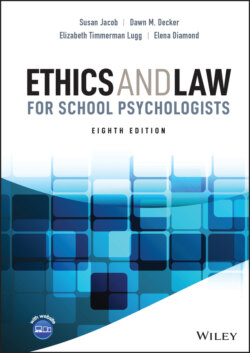Читать книгу Ethics and Law for School Psychologists - Susan Jacob - Страница 19
WHAT AND WHY OF PROFESSIONAL ETHICS
ОглавлениеThe term ethics generally refers to a system of principles of conduct that guide the behavior of an individual. Ethics derives from the Greek word ethos, meaning character or custom, and the phrase ta ethika, which Plato and Aristotle used to describe their studies of Greek values and ideals (Solomon, 1984). Accordingly,
ethics is first of all a concern for individual character, including what we call “being a good person,” but it is also a concern for the overall character of an entire society, which is still appropriately called its “ethos.” Ethics is participation in, and an understanding of, an ethos, the effort to understand the social rules which govern and limit our behavior. (p. 5)
A system of ethics develops in the context of a particular society or culture and is connected closely to social customs. Ethics is composed of a range of acceptable (or unacceptable) social and personal behaviors, from rules of etiquette to more basic rules of society. The terms ethics and morality are often used interchangeably. However, according to philosophers, the term morality refers to a subset of ethical rules of special importance. Solomon (1984) suggested that moral principles are “the most basic and inviolable rules of a society.” Moral rules are thought to differ from other aspects of ethics in that they are more important, fundamental, universal, rational, and objective (pp. 6–7). W. D. Ross (1930), a twentieth-century Scottish philosopher, identified a number of moral duties of the ethical person: nonmaleficence, fidelity, beneficence, justice, and autonomy. These moral principles have provided a foundation for the ethical codes of psychologists and other professionals (Bersoff & Koeppl, 1993).
Our focus here is on applied or practical professional ethics, the application of broad ethical principles and specific rules to the problems that arise in professional practice (Beauchamp & Childress, 2019). Applied ethics in school psychology is, thus, a combination of ethical principles and rules, ranging from more basic rules to rules of professional etiquette, that guide the conduct of the practitioner in their professional interactions with others. Furthermore, although school psychologists are employed in a variety of settings, in this text we emphasize the special challenges of school-based practice.
